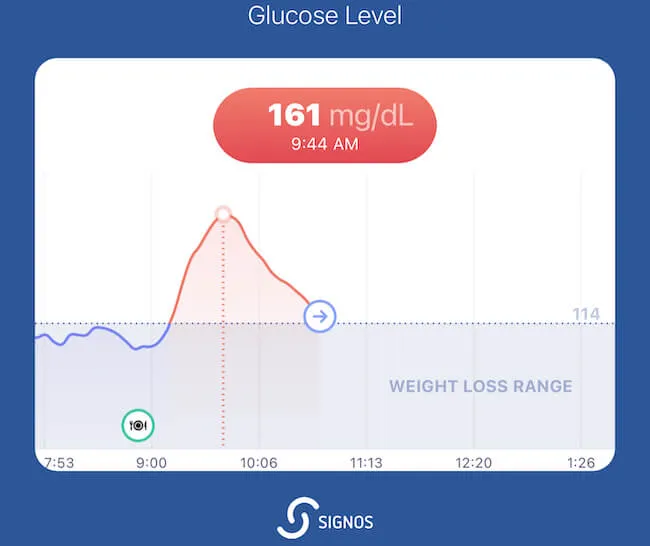What Is ACV?
Apple cider vinegar (ACV) is an acidic liquid made using a by adding yeast and small amounts of bacteria to apple juice. The yeast and bacteria metabolize the sugars from the juice and produce small amounts of ethanol, which is then converted into acetic acid (aka vinegar acid).
Acetic acid is believed to be the largest contributor to any health benefits associated with ACV. Acetic acid is a potent source of vitamin C, which is a known health-promoting vitamin and antioxidant that supports a healthy immune system1.
Currently, more research is investigating the link between vinegar and the impact it has on blood sugars and insulin sensitivity, as well as potential links between ACV and weight loss.
{{mid-cta}}
Is There Evidence ACV Helps With Weight Loss?
There is limited scientific evidence that apple cider vinegar helps with weight loss.
It may seem like everyone is taking a daily spoonful of ACV to harness the potential health benefits. From improved digestion to clearer skin, and now weight loss, some sources promote ACV as the miracle cure we have all been waiting for.
Some of these claims may be true, but unfortunately not all of them meet the current standard of scientific research. With respect to weight loss, there are limited peer-reviewed scientific articles that support the claim that ingesting ACV will result in weight loss.
An optimistic (though outdated) article published in 2009 in Japan demonstrated a modest weight loss in study subjects who consumed 1 or 2 tablespoons of ACV per day compared to a placebo group which did not receive ACV2.
Over three months, each group received ACV. The first group who received one tablespoon per day recorded an average weight loss of 2.4lbs, and the second group who drank two tablespoons recorded an average weight loss of 3.6 lbs.
Blood samples taken throughout the study showed that participants experienced a decreased value of triglycerides, a fat in the blood that can increase the risk of heart disease and other chronic diseases.
A more recent study from 2017 done on rats suggests that ACV may reduce the risk of obesity and decrease the harmful oxidative stress linked to a high-fat diet3. Although more data is required, the findings over the last two decades appear to be optimistic in terms of ACV’s potential to support weight loss efforts.

How long would it take for ACV to make a difference?
The limited published studies suggest a potential timeline of two to three months of consistently taking ACV before any possibility of observable results. If you want to try adding ACV to your diet plan, keep this extended timeline in mind.
<p class="pro-tip"><strong>Learn about </strong><a href=average-weight-loss-per-week>healthy weight loss per week</a></p>
Other Potential Health Benefits Of ACV
An exciting link between ingesting vinegar and delayed glucose response has been established throughout several reviews4,5. People who consumed vinegar with their meal or directly after eating observed lower changes in blood glucose, and some even reported greater satiety after their meal6.
We can speculate that people who are more satisfied with their meals will be less likely to overeat later in the day. This mechanism may contribute to meeting weight management goals and/or sustainable weight loss, but more research is needed to confirm this hypothesis.
<p class="pro-tip"><strong>Learn about </strong><a href=signs-of-hunger>true hunger & its connection to blood glucose</a></p>
ACV Is a Natural Bacteria Killer
During the warmer months, many people preserve seasonal fruits and vegetables. Any misstep in this process can result in spoilage or unwanted growth of food bacteria.
Including ACV in the preserves will create an inhospitable environment for any unhealthy bacteria, including E. Coli. It is an all-natural ingredient that will help the shelf-life of your goods and prevent harmful pathogens from developing7.

How to Include ACV in Your Diet
Apple cider vinegar is found near other vinegars at your local grocery or health food store. There are several different brands, so you’ll want to choose a product that contains whole natural ingredients with as few preservatives or additives as possible.
How Much ACV to Take
Start with one tablespoon of ACV per day, diluted in a cup of water. Monitor how you feel afterward before increasing your dosage. Avoid drinking ACV if you have any open cuts or cold sores in your mouth as vinegar can aggravate wounds.
The limited literature available suggests that 1-2 tablespoons of ACV diluted in water each day is plenty. Remember, ACV is a type of vinegar and the acidity can deteriorate your tooth enamel.
How Often to Take ACV
Like all health and lifestyle changes, consistency is important. Daily consumption of ACV appears to be recommended for best results.
What Time of Day to Take ACV
Some practices recommend drinking ACV prior to eating a carb-rich meal. Others suggest drinking ACV with a meal, or immediately after eating high-carb foods.
A good approach to take is using a continuous glucose monitor (CGM) device to see how the timing of ACV consumption affects your blood sugar levels.
You may have a difficult time drinking vinegar on an empty stomach, especially if you have a sensitive stomach. If this sounds like you, opt to drink ACV with a meal or directly after eating.
<p class="pro-tip"><strong>Learn about </strong><a href=what-is-a-continuous-glucose-monitor>how CGMs work</a></p>
Tips for Masking the Taste of ACV
ACV is very tart with a mild apple flavor. Some people love the tang of apple cider vinegar, but it is not for everyone. If you can’t stand drinking diluted ACV, you can try mixing it into other foods.
More Ways to Take ACV:
- Include ACV in salad dressings and combine it with other health-promoting ingredients, such as fresh garlic (rich in antioxidants) and olive oil (which contains heart-protecting fats).
- Try this avocado cilantro lime dressing created by the Signos team
- Add ACV to your meat or fish marinades. The acidity cuts through fat and pairs perfectly with richer cuts of protein.
- Serve ACV with olive oil for dipping bread as an appetizer. To enhance the flavor add oregano, basil, and fresh garlic to your dip.
You can pair ACV with any meal you like, but if you are actively trying to manage your blood sugars, try to consume ACV around your most carb-dense meals of the day.
<p class="pro-tip"><strong>Discover </strong><a href=recipes>more healthy recipes from Signos</a></p>
What About ACV Gummies?
ACV gummies came on the market to help people ingest ACV while avoiding the harsh taste of drinking vinegar. Creating a gummy to bypass the vinegar taste is a creative idea, but there is no research to show that ACV gummy products will have the same effect as drinking ACV.
The star ingredient of ACV is acetic acid, which is powdered before being added to ACV gummies. The quantity of acetic acid included in each gummy varies per formula and per brand. If you choose to try an ACV gummy, opt for a brand with a higher percentage of acetic acid, and as few fillers and sweetening agents as possible.
Potential Negative Side Effects of ACV
The greatest concern about consuming ACV is the detrimental effect vinegar has on your teeth. It can eat away at your tooth enamel,8 which increases your risk of tooth sensitivity and dental erosion9.
Drinking your diluted ACV mixture through a straw will significantly reduce how much vinegar comes in contact with tooth enamel, to protect your teeth.
People with pre-existing dental issues may opt for ACV gummies to avoid further damaging their teeth. It is unknown if the gummy products are as effective as liquid ACV, but it is an understandable compromise.

Monitoring the Effects of ACV On Blood Sugar as Part of a Weight Loss Program
The best way to know if ACV will be helpful to your weight loss goals is to give it a try for at least three months. Use your CGM to track how your blood glucose is affected by taking ACV.
Some evidence provided in this article suggests that ACV can aid with satiety. In addition to your CGM data, track how satisfied you feel after eating each meal or snack. How long does it take until you feel full? Are your portion sizes getting smaller? After a couple of months, look back through your notes to see if there are any connections between ACV consumption and satisfaction.
Other Factors That May Support Weight Loss
Adding ACV to your diet may help you lose weight, but it is not a guarantee. Other noteworthy circumstances that can impact your weight loss goals include sleeping habits, stress levels, workouts, and non-exercise activity. You can monitor how these other factors impact your blood sugars using your CGM.
That data may prompt you to experiment with the timing of your meals and the timing of your workouts. The best part about using a CGM device is that you can uncover patterns unique to your body, and make corresponding lifestyle choices to support your goals.
<p class="pro-tip"><strong>Learn about </strong><a href=stress-and-blood-sugar>stress & blood sugar</a></p>
The ACV/Weight Loss Takeaway
Liquid ACV contains the highest concentration of acetic acid, which appears to be the main health-promoting molecule in apple cider vinegar. Gummy ACV products have lower levels of acetic acid compared to liquid ACV and have no research to support their claims.
If you choose to add ACV to your diet, start slowly, with only one tablespoon of ACV diluted into water per day. Drink diluted ACV through a straw to reduce the risk of tooth enamel erosion. Take ACV in close proximity to a meal, and use a CGM to track your blood glucose response.
During your weight loss journey, consider other actions you can take that will support your efforts. Managing your stress, getting high-quality sleep, and regular exercise are all recommended for people trying to lose weight.
If you do not see any changes on the scale, do not get discouraged. Healthy behaviors can still positively impact your blood sugars, blood pressure, and cholesterol levels.
<p class="pro-tip"><strong>Also Read: </strong><a href=weight-loss-for-beginners>weight loss for beginners</a>.</p>
Topics discussed in this article:
References
- Carr, A., & Maggini, S. (2017). Vitamin C and Immune Function. Nutrients, 9(11), 1211. https://doi.org/10.3390/nu9111211
- KONDO, T., KISHI, M., FUSHIMI, T., UGAJIN, S., & KAGA, T. (2009). Vinegar Intake Reduces Body Weight, Body Fat Mass, and Serum Triglyceride Levels in Obese Japanese Subjects. Bioscience, Biotechnology, and Biochemistry, 73(8), 1837–1843. https://doi.org/10.1271/bbb.90231
- Halima, B. H., Sonia, G., Sarra, K., Houda, B. J., Fethi, B. S., & Abdallah, A. (2018). Apple Cider Vinegar Attenuates Oxidative Stress and Reduces the Risk of Obesity in High-Fat-Fed Male Wistar Rats. Journal of medicinal food, 21(1), 70–80. https://doi.org/10.1089/jmf.2017.0039
- Santos, H. O., de Moraes, W. M., da Silva, G. A., Prestes, J., & Schoenfeld, B. J. (2019). Vinegar (acetic acid) intake on glucose metabolism: A narrative review. Clinical Nutrition ESPEN, 32, 1–7. https://doi.org/10.1016/j.clnesp.2019.05.008
- Shishehbor, F., Mansoori, A., & Shirani, F. (2017). Vinegar consumption can attenuate postprandial glucose and insulin responses; a systematic review and meta-analysis of clinical trials. Diabetes Research and Clinical Practice, 127, 1–9. https://doi.org/10.1016/j.diabres.2017.01.021
- Östman, E., Granfeldt, Y., Persson, L., & Björck, I. (2005). Vinegar supplementation lowers glucose and insulin responses and increases satiety after a bread meal in healthy subjects. European Journal of Clinical Nutrition, 59(9), 983–988. https://doi.org/10.1038/sj.ejcn.1602197
- Yagnik, D., Serafin, V., & J. Shah, A. (2018). Antimicrobial activity of apple cider vinegar against Escherichia coli, Staphylococcus aureus and Candida albicans; downregulating cytokine and microbial protein expression. Scientific Reports, 8(1). https://doi.org/10.1038/s41598-017-18618-x
- Kanzow, P., Wegehaupt, F. J., Attin, T., & Wiegand, A. (2016). Etiology and pathogenesis of dental erosion. Quintessence international (Berlin, Germany : 1985), 47(4), 275–278. https://doi.org/10.3290/j.qi.a35625
- Maladkar, S. R., Yadav, P., Muniraja, A. N. A., Uchil, G. S., George, L. V., Augustine, D., Rao, R. S., Patil, S., Sowmya, S. V., & Haragannavar, V. C. (2022). Erosive Effect of Acidic Beverages and Dietary Preservatives on Extracted Human Teeth—An In Vitro Analysis. European Journal of Dentistry. https://doi.org/10.1055/s-0041-1742131




.svg)










.svg)
.svg)
.svg)
.svg)
.svg)
.svg)
.svg)
